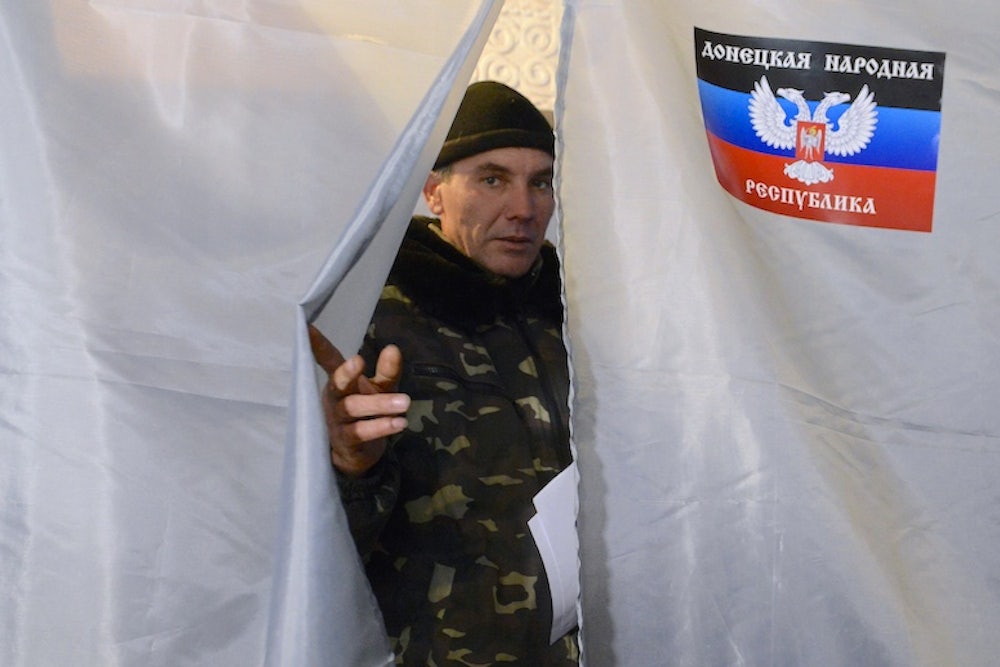An untold number of Ukrainians living in rebel-held territories of Donetsk and Luhansk turned out Sunday in separatist elections. Everything about the vote was farcical, save for the voters themselves: exit polls showed results from 100.1 percent of votes cast; one candidate for prime minister of the Donetsk People’s Republic (DNR) endorsed his incumbent opponent, Aleksandr Zakharchenko, declaring in an interview with The New York Times, “We don’t have any differences, none at all”; piles of vegetables were distributed for almost nothing at polling sites in an attempt to lure voters; the election was monitored not by the Organization for Security and Co-operation in Europe, but an entity dubbed the Association for Security and Cooperation in Europe that's staffed by far-right politicians from some twenty countries. Only one country has recognized the election—Russia, of course.
But that doesn't mean the West shouldn't take the vote, which elected new parliaments and prime ministers of the self-declared Donetsk and Luhansk People’s Republics, seriously. It's yet another step toward a permanent stalemate.
The vote seems to have been designed to mimic the long-awaited parliamentary elections the Ukrainian government held last week. “Moscow recognized the Ukrainian parliamentary elections, and now they [say] the world should recognize this one, too. From their viewpoint this is ‘50-50,’” said Balázs Jarábik, a visiting scholar at the Carnegie Endowment for International Peace. The rebels “tried hard to replicate what they know about elections—so this all looked like [elections] in the USSR.” Zakharchenko was handily re-elected, with over 70 percent of the vote, as was Igor Plotnitsky, the incumbent leader of the Luhansk People’s Republic. Inauguration ceremonies will be held Monday.
The DNR Central Election Commission claims that over 1 million votes were cast, but the exact numbers are unknown. The long lines at polling stations were partly because there were “five times fewer polling stations” open than in the referendum the rebel governments held in May, Buzzfeed’s Max Seddon reports. But the significant turnout proves that there is real support for the separatist republics among the war-weary populace, even if civilians had varied motives for turning out on Sunday.
“Despite the surreal nature of the vote, there is no doubt that, among the older generation at least, there was great enthusiasm for it, perhaps less as an endorsement of the Donetsk republic and more as a message to Kiev that the region would never again be part of Ukraine,” The Guardian’s Shaun Walker reports. “Everything changed over the summer," one voter told VICE’s Harriet Salem. "I saw the refugees on the television. There was the shelling in Sloviansk and then everywhere else. It was then I realized there was no way back to a united Ukraine. By the time the DNR came here, it was a relief."
The elections have been condemned by the U.S., E.U., and Ukraine for violating the September Minsk agreement—a truce between the rebels and the Ukrainian government—which stipulated that “early local elections in accordance with the Law of Ukraine” would be held in rebel territories. The Ukrainian government had scheduled those elections for December 7. “They cannot be organized without complete conformity with the Ukrainian legislation, the provision of methodical and other assistance by the Central Election Commission, the presence of international observers, the absence of armed people on the streets and the guarantees of free expression of will of the citizens," Ukrainian President Petro Poroshenko said in a statement.
The rebels, of course, claim that the elections were entirely legal under the provisions of the Minsk agreement. "It was said there [in the Minsk protocol] that we have the right to hold our own elections. The date was not specified," Zakharchenko said on Sunday, RIA Novosti reports. It is abundantly evident that the Ukrainians had no plan for how exactly “early local elections in accordance with the Law of Ukraine” could possibly be held in rebel territory, just like it is also painfully clear that the government has no plan for how that territory will ever be re-integrated into the rest of the country.
As the world’s attention has waned, the situation in Ukraine has only deteriorated over the past weeks. Remember when, a few months ago, there everyone was frantically speculating about whether the first humanitarian convoy Russia sent to Ukraine was a Trojan Horse? Now there is an actual Russian convoy carrying actual Russian arms inside eastern Ukraine, where the Russian government continues to fund the self-proclaimed separatist governments. Only this weekend were all of the remains of those killed aboard the Malaysian Airlines Flight 17 in July finally identified.
It’s funny how these days, half of the news reports on Ukraine end with a long summary of the conflict, reminding readers why anyone cared about all this in the first place. It’s easier to read about, and cover, conflicts in which solutions are being debated and carried out. In Ukraine, there aren’t many.
